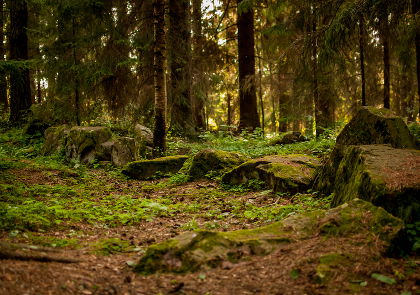Jonathan Dodd‘s latest column. Guest opinion articles do not necessarily reflect the views of the publication. Ed
Oh how time flies! It seems like only five minutes ago when I was sitting in front of this screen wondering what on earth I was going to write about this week, and here I am again. In déjà-vu-land.
I hope you, my dedicated reader, if you’re out there, if you’re reading this, if you even exist, are going to be patient with me this week, because although my fingers are flying over the keyboard just like time doesn’t, I don’t sense any actual purpose to their frantic movements. Perhaps I’ll be lucky, as usual, and something will appear from the dense forests in which all my words and ideas frolic and breed.
The aforementioned forests
I suppose it might be interesting to explore the idea of minds as landscape. I’m inclined to think of mine as a rather mixed terrain. There are of course the aforementioned forests, dark and deep and a bit primeval. I’m not afraid to venture in there, but I do generally leave that place alone. I think it’s healthy to have a large space that I don’t go into. It encourages wildlife, and it’s unspoilt and uncultivated. And unexplored.
I like that idea. If I ruled a planet I like to think I’d leave large parts of it strictly out of bounds. Old maps of the world used to have interesting edges and far corners, where the old cartographers, frankly, made it up. After all, since nobody had gone there and measured it, who could contradict them? And just in case anyone did, they would cheerfully write – ‘Here Be Dragons’ underneath a fanciful drawing of a fire-breathing flying creature.
No mysteries any more
If dragons did not exist, of course it would be necessary to invent them. Nowadays the world is so completely explored and measured and filmed that you can go and see what a street looks like in practically any town or village on the planet. And consequently, there are no mysteries any more. And everywhere looks like everywhere else.
I recently rediscovered an old hero of mine, the SF writer Robert Heinlein, whose books I read avidly for years. Every time a new one came out, I would get down to the bookshop and devour it. He thought that the exploration of Space would be driven by the need to find somewhere else to live, once life became unbearable in Earth.
A man in a suit carrying a briefcase
His stories were all about pioneering, boldly going where no man has gone before and starting colonies wherever it was possible to get a foothold. Rather like the way we used to explore this planet. He rather liked that idea, and one of his characters put it very clearly – ‘When you see a man in a suit carrying a briefcase, it’s time to move on!’ – because that meant civilisation, government, and people telling you what to do (and what you couldn’t do).
The adolescent Jonathan found this all very heady stuff, and it was a perfect metaphor for life as mine was at that age. I’m not sure I’d enjoy so much freedom now, having settled to the idea of comfort and the security of four walls. Although sometimes I would prefer it if there were considerably fewer people sharing the planet with me. Let’s face it, who wouldn’t?
A colony on Mars in the next ten years
So imagine my surprise when I read a news piece this week about Mars One, a plan to establish a colony on Mars in the next ten years or so. It’s a private foundation that plans to start sending various cargo pods full of supplies off to Mars in the next few years, and then a small crew of four to put it all together until more people arrive. They plan to be self-sufficient, and believe that it’s all possible with current technology.
I was astonished to find out that this is a real plan, and that I hadn’t heard about it. Worldwide, over 78,000 people have applied to go. How on earth would they select people? This is not a space mission, it’s emigration to an unknown territory, rather a long way away, with no expectation of returning, and it’s being planned now. Rather like Christopher Columbus, but bang up to date.
Private companies and foundations
Interestingly, in the Heinlein books, it was private companies and foundations that made the running for colonisation. Perhaps at the cutting edge governments are less likely to get involved or have the vision. After all it would be difficult to imagine Facebook or Twitter being developed by civil servants.
Perhaps we really are at that point now, where SF becomes reality rather than just a load of fantasy stories. How exciting! And how scary! I wonder how much the real thing will correspond with the imaginations of our writers. And what will they find to write about next?
If you have been, thank you for reading this.
Image: Quinn Anya under CC BY 2.0
Image: jpeura under CC BY 2.0
Image: Top Gold under CC BY 2.0
Image: orinrobertjohn under CC BY 2.0
Image: pagedooley under CC BY 2.0
Image: janinebeangallery under CC BY 2.0










